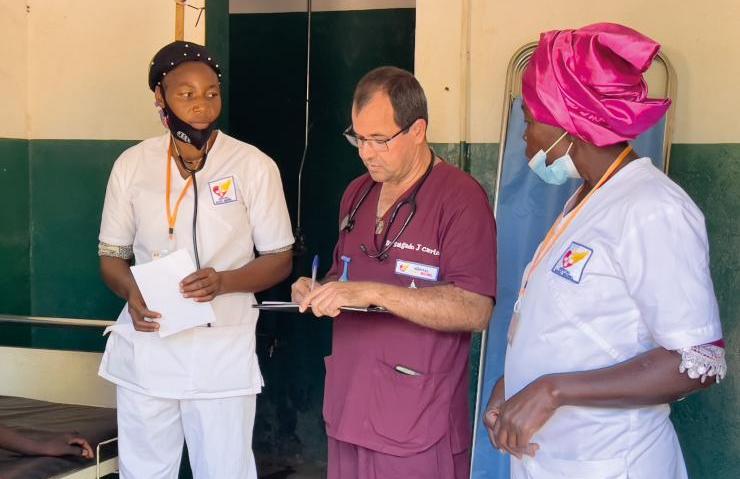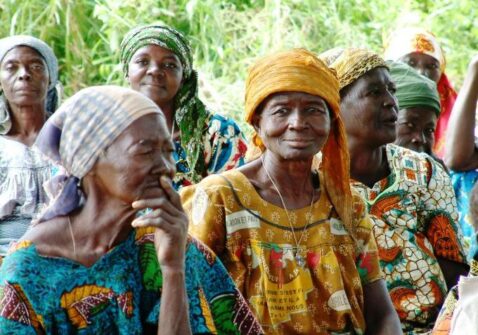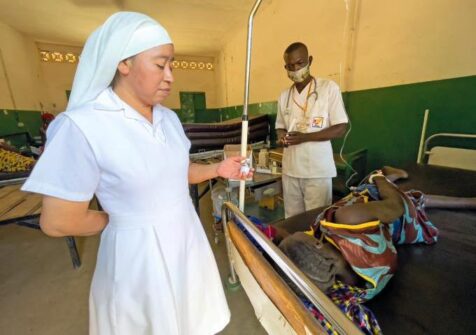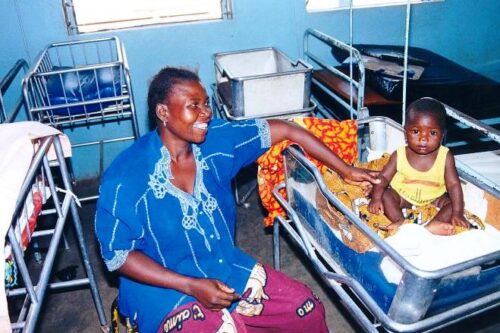Chad. Promoting Integral Health.

At St Michael’s Hospital in Donomanga, Chad, a team of health professionals, co-ordinated by the Mexican Comboni Missionary Brother and medical doctor, Juan Carlos Salgado, does everything possible to ensure that patients are treated with respect and professionalism, healing them and helping them to have hope. We went to visit the Hospital.
We left Laï, in the south of Chad, at six o’clock in the morning, while it was still dawn. We were travelling to Donomanga, a small town 80 km away, where we were going to see the work done at St Michael’s Hospital. The institution belongs to the diocese of Laï and is part of the network of health services run by the local Caritas.
Along the roadside, villagers, mostly women and children, carry buckets and basins with water that they collect from the communal well and the firewood they use for cooking. Some children walk to school, under a scorching sun, as the temperature starts to rise and soon exceeds 35°C.
Serving the sick with joy
After a bumpy three-hour drive, we pass through the main gate of St Michael’s hospital. The first thing we see are groups of people sitting in the shade under leafy trees. Others occupy the corridors outside the various wards. “It is the patients’ families who take care of them. Each family takes responsibility for their patient, cooks for them and keeps a close eye on their health,” explains Brother Juan Carlos Salgado, a Comboni missionary and the only doctor practicing in these facilities.

Each family takes responsibility for their patient, cooks for them and keeps a close eye on their health.
Sister Angela, a Mexican nurse who has been in Chad since 2008, belongs to the congregation of the Daughters of the Sacred Heart of Jesus. She collaborates with the administration of the hospital and takes us on a tour of the facilities. She tells us that the hospital has a capacity for 70 inpatients, divided between paediatrics, maternity, general medicine and infectious diseases. The hospital is the only one for more than one hundred thousand inhabitants of the Donomanga district. Sister Maria Oralia, also Mexican and who arrived in Chad just over a year ago, tells us that the logistics of storing the medicines were demanding and complicated, as there is no public electricity service and they had to use a diesel generator and batteries. However, “this task is now easier – she says with a smile -, because a few days ago 24 solar panels were installed and guarantee energy throughout the day and allow us, for example, to preserve medicines which need low temperatures for storage.” Bro. Juan Carlos adds that it can be difficult to understand how a hospital can function without energy, but “they have adapted to working with scarce resources”. He says they can now “have a blood bank, keep basic services running for 24 hours and even perform some operations with more peace of mind in case of emergency”.
Daily challenges
The hospital does not have many staff members, since, including all the employees, only 38 people work there. When we arrived, Bro. Juan Carlos was in his consulting room attending to the outpatients arriving that day. He says that many people arrive at the hospital already very sick, because “first they resort to local medicines and healers and only after that, if there are no positive results, they come to the hospital”. Many patients arrive already very ill, for example, with major infections resulting from accidents or injuries with knives, machetes or weapons, or very advanced diseases. The most common diseases in the region are infectious diseases, namely tuberculosis and malaria, child malnutrition and respiratory diseases. During the rainy season from May to September, malaria frequently affects children and the recovery process is more complicated, as many suffer from severe anaemia.

Sister Maria Oralia in charge of the logistics of storing the medicines.
The missionary doctor’s working day starts early with visits to patients in the different wards; it continues with outpatient consultations, ultrasound scans and minor surgeries. “The more complex and time-consuming surgeries are scheduled for Thursday and Friday each week. However, in case of emergency, they are done at any time, even during the night,” explains the missionary. For this, there are two operating theatres, equipped with the essential equipment. Before coming to Chad, Bro. Juan Carlos worked in the Democratic Republic of Congo.
For the past two years, he has been carrying out a difficult service, but one that fulfils him as a person, as a missionary brother and as a doctor. “I am happy to be here. I like the quiet life of the countryside better than the stress and hustle and bustle of the big cities,” he explains. However, working in this remote location has its limitations, drawbacks and challenges. The biggest challenge he faces as a doctor “is the lack of support from other experienced colleagues, with whom I could talk and discuss the more complicated clinical cases”. Nevertheless, he says that over the years of practice, he has gained “confidence to make decisions” and, whenever possible, he has tried to consult “friendly colleagues using communication platforms, as new technologies allow this teamwork”. He adds that, despite being in a remote location, this does not prevent solidarity. There is a group of Spanish ophthalmologists who come every year to work, with great dedication, for two weeks as volunteers at the hospital. His dream is to have teams of volunteer doctors from other specialties, especially in oral health, as “this service is practically non-existent in this country”.

He says that when he first arrived in Chad, he had difficulty adjusting to the climate and the extreme temperatures. With such an intense workload, it is easy to become dehydrated in this climate, so “I often suffer from kidney stones”. As malaria is endemic, he is also recurrently infected, and this year he has already suffered three characteristic bouts of the disease. Helping hands of brotherhood and solidarity due to the limited resources of the people in the region—most of them are engaged in subsistence farming—consultations and hospitalization cost very little. As the hospital receives no state funding, finding the funds to keep it running is always a major challenge, requiring ‘creativity and budgetary discipline’. Among the most urgent needs, Bro. Juan Carlos mentions are an X-ray machine; a unit for sterilizing clothes and surgical instruments; a new refrigerator for the blood bank; and a repair of the leaking water tank. He adds that “working with limited resources is not easy,” but they have learned to manage them so that “everything works well”.

In addition, everyone at the hospital is aware of recycling and minimizing waste as much as possible. Bro. Juan Carlos has many projects in mind for the future of the hospital, especially those aimed at ensuring its sustainability. Among these, he mentions the planting of cashew nuts to sell the fruit and the purchase of a tractor to till and cultivate the land owned by the hospital. Bro. Juan Carlos’ face shows the serene joy of a life given out of love for God and our most vulnerable brothers and sisters. “With my service, I do everything I can to make people healthy and happy. Everyone is treated with the respect and dignity they deserve. My greatest joy is to see patients going home cured,” he confesses shyly.
The missionary doctor ends his days tired and often stays at the hospital even at night because he has to perform urgent operations. Despite the difficulties, Bro. Juan Carlos is a happy person, for the mission he carries out with his competent, fraternal and supportive hands, which help to give life and hope to the inhabitants of this remote village in Chad.(Open Photo: Br. Juan Carlos with two hospital nurses.)
Bernardino Frutuoso



